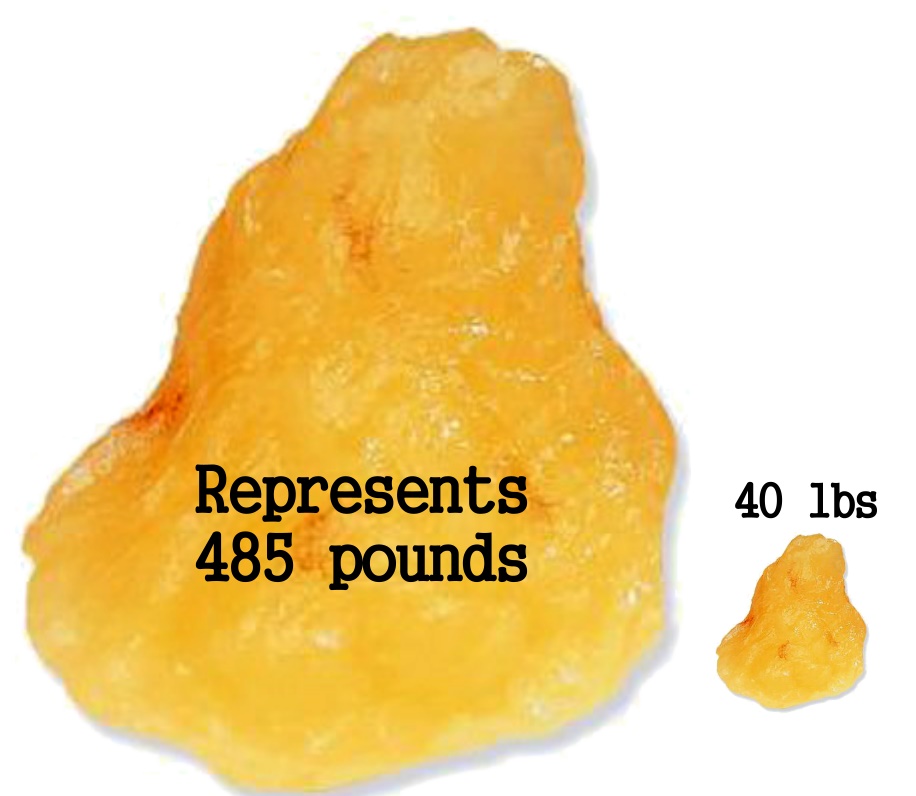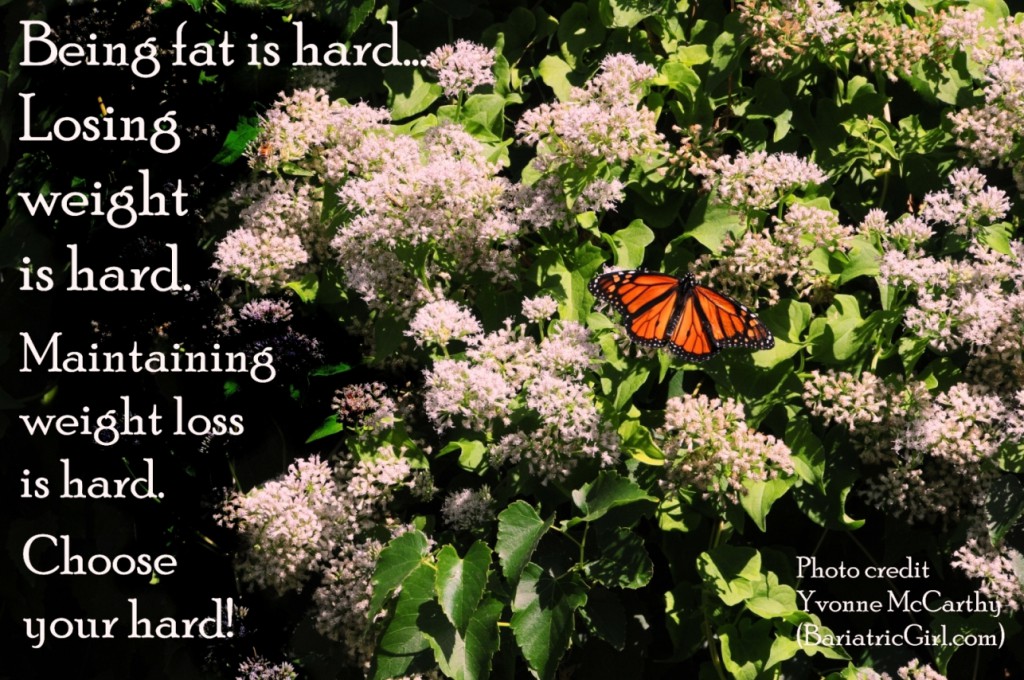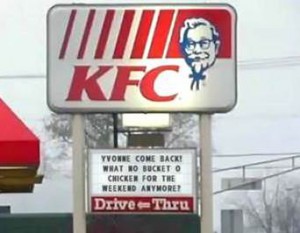Archive for the ‘Cross addiction’ Category
Take off those regain glasses and turn it around!
03/02/2014 by Yvonne McCarthy • 12 Comments | Leave a Comment »
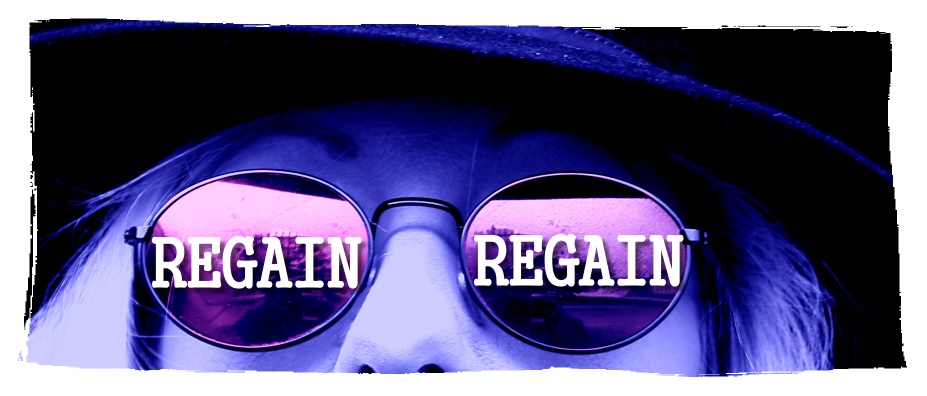
Regain glasses suck.
The moment regain becomes a problem we put on those regain glasses and NOTHING looks good.
A few years ago I distinctly remember reading a post from a woman that went something like this.
I hate my hair. I don’t like my face and don’t know how to use makeup. I hate what I’m eating every day and I’m sick of it. Oh and I gained 5 pounds.
One of my most often repeated quotes….”we are rarely upset for the reason we think”. Of course I assume you can guess what she was really upset about. I wrote her and told her to get a cute haircut, go to a department store and get someone to show her how to do makeup (free) or check out thousands of makeup videos on You Tube. I also told her she could change what she eats every day. Of course none of that made her feel better because she didn’t FEEL like doing any of that because she was wearing her regain glasses loud and proud. It is a vicious cycle because you can’t fix the regain until you feel better and you won’t feel better unless you fix the regain.
It seems that for most people everything looks pretty awful through those regain glasses. I want to help you take them off. You say “Yeah right…like I haven’t tried… and mostly….. I don’t FEEL like it. I don’t feel like doing anything.” I have often pointed out that when you were at this weight on the way down you were ecstatic! Do you see how your perspective totally messes with your head? Why do we obsess about the lowest weight we ever reached instead of constantly realizing what our highest weight was and being grateful we aren’t there? And if you choose to obsess about your lowest weight, doesn’t it make sense to move towards doing something about it instead of continuing to walk down regain road?
Unfortunately we have this big adjustment to make after weight loss surgery because the first year we are wearing the “honeymoon glasses” and EVERYTHING looks GREAT! Remember how wonderful everything was when you lost your first 30-40 pounds? Yet you were heavier than you are now. You could hardly mess up at all the first year. It was all good!
One day you wake up and you can’t find your honeymoon glasses. You start to take for granted the little things like being able to tie your shoes, paint your toe nails, fit in an airplane seat….. and the next thing you know it isn’t enough anymore. Some of us hang in there for a while or even a long while and eventually something shifts and you start to think about how much you miss those honeymoon glasses…. you start looking for that feeling in other things like our old friend Mr. Food. He’s tappin’ you on the shoulder every day…”Pssst….remember me? Remember how much fun we had? Oh come on… a little sum-um sum-um won’t hurt you”. All the while your old friend has some regain glasses stuck in his back pocket just waiting to slide them on your face.
One of the most extreme cases of the perspective meter being out of whack was a woman I met who had lost 485 pounds. Not a typo! She lost 485 pounds but she had gained 40 back. She was all out of sorts and literally more miserable than when she weighed her heaviest.
I asked her to imagine that 485 pounds sitting on the floor. Right next to it 40 lbs. I guess we could say it looks something like this. (For those with perfectly analytical brains please forgive me…I guesstimated it)
I told her not to give that 40 pounds the time of day and dust it off. We give that regain so much power and of course we can pile plenty of shame on top of that for good measure. Shame is toxic, shame keeps us down. Shame keeps those horrible regain glasses cemented to our face.
Here’s the thing….if you don’t take off the glasses and begin to turn things around….chances are that you’ll look up in another year with more regain. Get off the insanity train today. Of course you remember… “Insanity=doing the same thing over and over and expecting a different outcome”
Everyone is different but here are a few suggestions. You can’t build Rome in a day but you can always do the next best thing.
Look at your before picture in the morning and FEEL what you felt like. Sit it that for a while. I do that every morning without fail. Remember the things you wanted so badly. BE GRATEFUL you aren’t there. If I could put you back in that body for a week you would be SO grateful to be you right now.
Quit thinking about the perceived mountain you have to move and pick up the shovel and start with one scoop at a time. Instead of Nike’s “just do it”, change it to “just start”. It’s too overwhelming to plan into the next century. I can hear the questions now….how long will this take? It DOES NOT matter. Just move toward your goal instead of away from it….. just for today. Today is all that counts.
Get the crap food out of your house. I know many people who find creative ways to do this with a family that feels they have to have the crap food. Put it in a place it can locked up but you’d do your family a favor by getting it out of their reach as well. Sugar and junk food is as addictive as any drug and they will guarantee that you will still be wearing those regain glasses. See my “M&M” story in this post.
Find a way to move your body that you can enjoy. I LOVE to dance. I hate to run….I wanted to love it but I don’t. I wanted that runner’s high and I just could not get it. I love yoga and if you think you can’t do it, watch this! I describe yoga as slow dancing with yourself. Abby Lentz from Heartfelt Yoga is a dear friend. Look her up, she has DVD’s.
You won’t do anything for very long if you perceive it as suffering. When you eat healthier food envision how you are nourishing your body. Remember it will make you feel better and look better instead of putting on more weight which equates to depression, physical pain, more misery and a shorter life span. Again the most important part of this is to stop the bleeding that has begun with regain. Nothing in life is easy so here comes your choices……choose your hard.
Now THIS clarifies food addiction!
12/01/2013 by Yvonne McCarthy • 6 Comments | Leave a Comment »
I finally found an article about food addiction written in a way that is easily understood by all. Below you will find the normal behavior versus the addictive behavior. Here’s an excerpt from that section:
- Dependence on food will be habitual, while addiction to food will be somewhat unpredictable (e.g., a morning cup of coffee versus the sudden, inexplicable drive to eat four servings of cheesecake)
- Dependence on food will have few, if any, emotional causes, but addiction to food is provoked by emotions and circumstances that cause feelings of powerlessness (e.g., a treat to get through a trying day at work versus a binge to avoid focusing on painful thoughts
- Dependence on food will have few, if any, emotional effects, whereas addiction to food will cause great anxiety if not properly attended to
(e.g., being cranky due to caffeine deprivation versus feeling panicked because a planned binge is interrupted) - Dependence on food will cause minimal interference in other areas of a person’s life, but addiction to food will disturb every aspect
(e.g., a love for red wine with dinner versus preferring to eat alone for the sake of overeating) - Dependence on food can be controlled at will, but food addiction appears as an unstoppable force in the person’s life
(e.g., giving up pizza after noticing slight weight gain versus trying to stick to a healthy eating plan but derailing constantly; having a divided mind that seems to want opposite things) - Dependence on food is pleasurable, but food addiction is a torment
(e.g., traditional Christmas cookies versus the horror one has that one has eaten the whole box of cookies, coupled with the knowledge that one isn’t done yet) - Dependence on food is casual, whereas food addiction appears to the addicted person to be closely tied to his or her identity
(e.g., the guilty pleasure of Cheetos versus the shame and feelings of inadequacy that often accompany a binge)
Perhaps one of the most important paragraphs is below: (helpful to read the entire article)
What happened in this scenario demonstrates what, for many people, is the central issue of food addiction. Bingeing allows the food-addicted person to avoid dealing with threatening emotions (such as his or her perceived failure, powerlessness, or inferiority) by replacing them with guilt and shame, which are also threatening, but in a familiar, almost comfortable way. In the mind of the food-addicted person, the pivotal issue is lack of willpower. But in truth, they are using food to defend themselves against the pain in their life. By facilitating this transfer and avoidance of emotions, food has become a drug, and it is at this point that the food-addicted person needs to seek help.
Bingeing has a different meaning for most people. When I was obese I thought it meant that you ate in the closet in the dark with a whole package of Oreos and a gallon of milk. Of course I didn’t do that so I didn’t think it applied to my behavior. (umm…denial) Finally I realized that my weekend routine of buying a huge Bucket ‘O Chicken and locking myself in my apartment from Friday evening until going to work on Monday morning was certainly a form of bingeing. The same thing applied to my Quarter Pounder with Cheese obsession. I’m sure the Dallas quarterly earnings dropped significantly around the time I woke up to my dependence on this junk food.
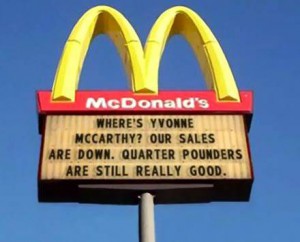
Most importantly please, please, please….do not walk the path of shame. From that same paragraph the very important part of the article… “In the mind of the food-addicted person, the pivotal issue is lack of willpower. But in truth, they are using food to defend themselves against the pain in their life.” How sad it is that we are just trying to avoid the pain of life by using food. The problem is that it never works without paying a great price. Ask for help, educate yourself, and know that freedom from this disease is truly possible.
Cross addiction after weight loss surgery
11/24/2013 by Yvonne McCarthy • 4 Comments | Leave a Comment »
 Have you experienced cross addiction after weight loss surgery? Do you think you might have a problem?
Have you experienced cross addiction after weight loss surgery? Do you think you might have a problem?
You are not alone….
My post today was inspired from an insightful blog post on OAC’s site called “Risk factors for cross addiction” by Dr. Nicole Avena.
I’m nearly 13 years post-op RNY (open gastric bypass) and this subject is by far my most passionate. There are many patients who have had weight loss surgery but have no benefits for therapy nor even much access to any education about the psychological issues associated with food addiction. My favorite description of addiction is “uncontrolled use despite negative consequences”. That certainly described my obesity perfectly.
Every day I hear from dozens of post-ops that have no one to talk to. For those who don’t live in the trenches with post-ops 24/7 there are many hidden issues that so often never reach many professionals. I have seen every kind of surgery cross addict and I believe the study about RNY and alcoholism did a huge disservice because no surgery type is exempt. (that’s a long discussion for another time) Post-ops mostly cross addict to drugs, alcohol, sex, shopping, gambling and/or exercise. I have also seen many individuals get sober from drugs/alcohol and cross addict to food. Next they turn to weight loss surgery but when will they ever learn where the root problem lies? Additionally there is another subset of post-ops that hide in hush hush shadows because they “look” normal. I wrote a blog post a couple of years ago about these post-ops that pass in “normie land”. The comment section below that particular post has a wealth of information. This hidden group are the ones that do whatever is necessary to maintain their goal weight. One woman confided in me that she never thought she’d end up with a $200 a day cocaine habit. WLS Anorexia. WLS Bulimia. Included in that is the rampant opiate abuse and it’s legal because it comes from unknowing doctors (who are doing their best) when and if their patients progress to doctor shopping. Don’t even get me started on the diet drugs….
So many do not want to accept food addiction as real so why do I believe? I see the same inherent characteristics as addicts. Some don’t believe there is actually painful physical withdrawal from food. In this video you see the brilliant Tennie McCarty talk someone through food detox. Rarely have I seen video of Tennie crying …. it reflects the severe pain held so deeply in her memory.
I’ll borrow this from Dr. Phil “You can’t fix what you don’t acknowledge”. There should be NO SHAME in admitting you are dealing with addiction. Addiction is a disease and the shame keeps us separate, feeling “less than”, and not asking for help. Instead of weeding out the pre-ops who show signs of addiction, I believe we should educate them at the time of surgery. Is this an easy task? Probably not any time soon but we have to start somewhere. Are we going to let the individuals who show signs of addiction die from obesity? Especially when it may be the root cause of the obesity? Even twelve years ago I gave an Oscar award winning performance in my psyche eval because I knew what they were looking for. Fortunately for me I had a doctorate in street cred on addiction because of a severely sick family member. I practice what I call “food abstinence” by eating healthy and avoiding almost all processed sugar, all processed foods and definitely no junk food. Sugar and junk food might as well be crack for me and I’m not the least bit deprived. Deprivation is losing what I have worked hard on for 12 years.
Thank you Dr. Nicole Avena for talking about this issue. The answers will come slowly but thanks to you and the many others who continue speaking out they might come a little sooner.
An illusion and another face of cross addiction
03/02/2011 by Yvonne McCarthy • 19 Comments | Leave a Comment »
 Pictures tell stories yet sometimes the pictures are an illusion.
Pictures tell stories yet sometimes the pictures are an illusion.
I love to be creative. The dress I was wearing was way too big and I just couldn’t bear to part with it so I played with the ways I could still use it in a photograph. To look at this image you can’t really tell the dress is huge. You also can’t tell that I haven’t had any reconstructive surgery yet. It is an illusion.
Women who are covering parts of their body can be very industrious. I remember thinking I was a master of disguise but that could have been delusional thinking because I probably wasn’t hiding how I was feeling under the layers of 4X shirts. As much as I tried to cover my obese body for thirty years my insides were screaming “I am ugly and everyone knows it!”. I was sure that every mean person treated me that way because of my size. (I was wrong about that…sometimes people are just mean.)
This picture was taken about a year and a half after surgery and I was ecstatic because I felt normal for the first time in my life. In those days “after care” didn’t exist and I was totally on my own. I assumed after I had surgery that I was supposed to lose the weight and be at goal forever. There was no one to say “way to go” but since I didn’t know any difference, I didn’t miss it. On the other hand I am so grateful I didn’t have anyone tell me that I would fail or that I had the wrong surgery or that I would gain it back so I followed all the rules and got the results I expected because I totally believed in the outcome. I didn’t even have to hear “*results not typical” even though they aren’t. I accepted my role, ignorance was bliss, and I didn’t consider it hard or easy…it just was what it was.
Part of the reason I have worked so hard to stay at goal was because I was afraid of what lengths I would go to if I were to regain my weight. My history of diets wasn’t pretty so why would it be any different this time around? I didn’t want to return to any of my previously mega unhealthy methods so I worked my program every single day.
Recently I got a message from someone who is at goal but has paid a terrible price. I have gotten several of these lately and there is no doubt that “regain messages” outnumber the ones I’m about to discuss. Like most actions that are associated with shame, this behavior hides in hush hush places and no one wants to talk about it openly.
We all know that many post-ops are set up to cross addict if we are not careful but the majority of stories are usually about those in the throes of chaos, the ones that have hit bottom….not the day to day present day functional addicts.
One email was from a woman that begged her bariatric doctor for diet pills to fight regain and now she has built up an immunity and it takes more and more of them to get the same affect. She didn’t want to go into detail about how she was getting more pills from another source. Another lady has turned into a full fledged bulimic and another has become anorexic. The last one talked about developing a $150-$200 a day cocaine habit.
This post is dedicated to awareness about the seemingly successful post-ops that have chosen something horribly unhealthy to stay at goal. Some of them are fighting monsters that no one knows about. It is never fair to assume things about anyone and I think through my blog and facebook page that many post-ops have figured out they can trust me so they share some of their darkest secrets. There are so many of us that need a safe place to fall…. where we aren’t afraid of being judged. Some of us are so busy pointing out what’s wrong with everyone else that few are willing to trust anyone long enough to ask for help. And for those that have no resources for therapy, I hope this opens the door for those that have written me and felt left out. Perhaps some of the professionals in the field will hear your voices and work to develop even more strategies to help those in need.
Regardless of who we are, all of us are doing the very best we can each day. Take a moment to reach out a helping hand because you never know who needs it the most… that seemingly healthy “at goal” post-op might just be an illusion. If you have access to therapy, use it. If you don’t, there are many good programs that are free of charge. Reach out to someone you can trust because together we are stronger. Remember to always pay it forward because it helps us in the long run and most importantly…. never forget where you came from.
Suicide after weight loss surgery
06/04/2008 by Yvonne McCarthy • No Comments | Leave a Comment »
There are always studies being done. Sometimes you don’t even know exactly what the study includes. I am always looking for data regarding weight loss surgery and it amazes me when “studies” are done and someone who knows little about the life of a WLS patient comes to a conclusion. I’m not complaining…I’m just saying that when I read the results of a story published (see link below) I want to scream “I know something about that!”
http://well.blogs.nytimes.com/2007/10/17/a-tragic-risk-of-weight-loss-surgery/
The study talks about a higher suicide rate after weight loss surgery. They talk about drug overdoses too. Well duh….
Speaking from experience, I have had many occasions to talk to several hundred members in various stages of their journeys. I believe that we are food addicts and guess what happens when you take away our drug of choice? If we are not properly educated we will find another. The other issue to take into account is the honeymoon period. (The year or so after weight loss surgery is the honeymoon period) The first year after weight loss surgery we are on a new “high” because no matter what we do….pretty much…. we are losing weight! WOOOO HOOOOO!!! The party is on. That is a most critical time because if you don’t use that time to retrain yourself to eat differently, you will most likely fail.
I have seen many people carry on as usual (no changing of lifestyle) and when the honeymoon party is over they crash. At this point they seem to have a few choices. They can make the lifestyle change they should have in the beginning (it’s much harder at this point), they can choose another drug of choice, or they can go back to the original drug of choice.
Back to the suicide thing….so….if you decide to choose another drug of choice and it’s actually drugs, you may very well overdose. If you go back to food and gain the weight back, the feeling of failure may be entirely too much to endure. After all you do it in front of your friends and family and EVERYONE knows you failed. You also might be one of those unlucky ones that has a friend or family who will tell you “I told you it wouldn’t work”.
I believe so much that we have to get the word out about food addiction and we must learn what it takes to overcome this disease. There is a phenomenal comment in the article about suicide. I’m sorry for the length of this post but there is just so much to share. The following is from Dr. Gerald Williams and it’s brilliant.
As I read these blogs, I am simply floored. Over the past 20 years I have likely conducted more pre-bariatric psychological evaluations (+2000) than any other psychologist that I am aware of. During this past 20 years I have had 2 bariatric patients attempt to take their lives with 0 deaths. I do not know if that makes me an expert, but I can probably be on safe ground being called “experienced in the field.”
First, I strongly believe that we, as a society, must “un-demonize” morbid obesity. To do so we must conceptualize morbid obesity for what it is, a brain-based neurological disorder. For too many years now we have approached morbid obesity as purely a psychiatric or psychological disorder, a lack of will power, or a flawed personality. Instead, we need to look at brain functioning. In the most simplistic terms, we develop “pathways” in our brains. These are very elegant sequences of neurons or brain cells firing in different areas of our brains. The more frequently that pathway is activated, the stronger and more easily it becomes for that pathway to continue firing. In morbid obesity, we have taken a very primitive and necessary pathway that is sometimes called a “primary drive” (hunger and satiation) and expanded into areas of emotional functioning wherein food takes on an emotional meaning or purpose. The pairing of a very powerful primary drive pathway with our equally powerful limbic or emotional pathways creates a very resilient and dysfunctional pathway which exists solely to perpetuate eating. we’re bombarded with advertisements which reinforce the continued firing of this pathway. Our brains have a lot of survival safety measures programmed in. To simply stop the eating creates an incredible level of anxiety and agitation in the morbidly obese individuals brain and often creates frantic attempts to restore food intake. The brain fully realizes that a disruption in food intake is not a superficial event but rather is a threat to its continued existence. Remember, historically, starvation has killed more of our species than any war or pestilence. We are the survivors. Our brains in particular are very sensitive to starvation. When our brain senses rapid weight loss it mobilizes its resources to do almost whatever is necessary to stop the weight loss and regain the weight. This is what makes dieting so difficult. Yo-yo dieting is the ongoing struggle between our physiology and our psychology. Obesity is therefore more in your brain than your belly. These dysfunctional pathways have a label in mental health, we call them “obsessive-compulsive disorders”. (If God were to grant me one wish, it would be to eradicate the obsessive-compulsive disorders from this world.) All obsessive-compulsive disorders (OCD’s) are anxiety or fear-based disorders. These OCD’s are again dysfunctional pathways. Remember however, fear feeds on itself. For example, if you fear not being loved, you do not have to experience rejection for that fear to grow. The simple experience or thought of that fear strengthens that pathway. Unfortunately therefore, this particular pathway feeds on itself and grows without encouragement.
Secondly, morbid obesity should be treated as a neurological disorder. Medications have their place but they will typically only serve to buy time. (Don’t let me undersell time though, it is one of our most precious commodities.) We should treat morbid obesity like we treat epilepsy or diabetes. As a multifaceted disorder, like epilepsy or diabetes, we should treat the medical, the psychological, and the neurological aspects simultaneously. To do any less is to guarantee failure. The prognosis for success is however quite good. Early identification is the key to successful treatment. Prior to the surgery the pre-bariatric candidate should be evaluated by a team of professionals including physicians, dieticians, and psychologists. If disorders of impulse control or judgment are identified, referral to the appropriate professional must occur. Rejection must not occur. After the surgery, the bariatric surgery patient must participate in follow-up services including at minimum individual or group therapy and support groups. Treatment must focus on changing not just physical and psychological functioning, but brain functioning. (Throughout our lives our brains our constantly revising, reinventing, and literally physically changing their structure to adapt to demands in our lives.) To do this, the bariatric patient must work with a professional skilled in changing both psychological and brain functioning. These are very treatable pathways and disorders. There should be individuals in your community with these skills.
When I read these accounts, it was obvious to me that many bariatric patient were not properly educated, evaluated and treated prior to their surgery and seemingly tossed to the winds post-surgically.
Does bariatric surgery work? Yes, it does but it must be approached with the utmost care, self-evaluation, and good judgment.
For any shortcomings stemming from psychology and neuropsychology, I would like to offer my apology.For those of you still out there “In the wind”, I would encourage you to contact a mental health professional skilled in working with pre and post bariatric surgery patients.
P.S. I don’t have a book published but after reading these blogs I’m thinking maybe I should. What do you think?
Gerard R. Williams Ph.D.
(810)630-1152
Clinical NeuropsychologistLicensed Psychologist
— Posted by Gerard R. Williams Ph.D.
OK, if this post isn’t already long enough, I have to include my comment. So here it is:
Wow….I read in amazement one of the best discussions regarding WLS ever! I wanted to comment on nearly every post. Seven years ago I had weight loss surgery in 2001 (gastric bypass) and I have been at goal weight since. It was a battle that I fought every inch of the way but in the process I learned a great deal about what is REALLY going on because I live it every day. I have been a member of a large online support group for seven years. I did not have adequate aftercare… mostly due to the lack of it in 2001. By participating in the support group, I not only learned the very pitfalls of this disease but learned that by participating, I was keeping myself accountable to myself and others. This online group is the largest research study anyone could ask for… a living, breathing, group that grows in power and self education every day but has so much catching up to do.
You who say it is not an addiction have never walked in my obese shoes. An incredible description of addiction: Uncontrolled use despite negative consequences. That certainly described my obesity. I have some of the most profoundly addicted relatives on earth and my addiction was clearly food. The parallels are too numerous. As Mary Jo Rapini said, we are too much in a hurry to get the weight off and we’ll worry about everything else later because we assume the obesity is the only thing in our way. If you are not prepared for the reality that your brain must be fixed, you WILL crash…to the point of suicide. It’s not like you can just tell them and they are immediately OK. It takes time. You also have many professionals in the field that have yet to even mention the word addiction. Why is aftercare not required? There are many reasons. We don’t know to ask, the doctor doesn’t know, or the insurance doesn’t pay for it. If it is due to lack of insurance coverage, we are all out of luck. It seems every day I hear about yet another company refusing coverage for weight loss surgery itself….even if it is deemed medically necessary.
Every time anyone remotely close to the WLS community hears the words “quick fix” they are repelled. I had RNY open surgery (cut me open) and was in the hospital for five days. As we are speaking about here, the change is extremely difficult and when left to our own devices, we flounder. This rarely constitutes a “quick fix”. Secondly, if I chose any method that takes me from 30 years of obesity to 6 years of goal weight, why does my method matter as long as I am healthy??? I no longer have high blood pressure, sleep apnea or back pain. As many know, it has cured their type 2 diabetes.
You will also offend us every time you say the “old fashioned way”. I am so incredibly impressed with anyone that does it without surgery. I am SO impressed! In fact I did it several times. The only time I was thin for any length of time was in college for 2 years. I STARVED MYSELF to death so I am so proud for anyone that could do it without surgery and keep it off… but I could not…and I tried EVERYTHING.
The other day I realized that I had a tough time picking up a 40 pound sack of bird food but I was expected to be willing to exercise with 130 extra pounds on me. Do this experiment and live in my shoes. For one week, strap on four thirty pound bags of dog food and do everything you have to do. After 30 years like that you’ll be ready to do ANYTHING to get it off…especially an easy way…if one existed.
Dr. Williams you are excellent! I wish there were way more around like you. I have often spoke and written about being one of those “in the wind” and the numbers of post-ops lost is astounding!! There are a few of us trying to “pay it forward” for patients coming in behind us because of this exact situation. It is really difficult because we are just post-ops trying to help and many times even some of the professionals are standing in our way because we don’t have medical credentials. I am beyond grateful for the professionals that consider us valuable. Mary Jo Rapini is one of them. Many long term post-ops certainly know enough from experience that bariatric medicine is vastly misunderstood…even by some of the professionals. What do I have to back this up? Every bit of this is viewable online…the sexual and shopping addiction shortly after being thin for the first time, the new problem with alcohol, the low self esteem issues that never seen to improve, the lack of knowledge about coping mechanisms, and always looking to the future for the happiness we cannot seem to catch. We look for the future to make us happy because we have not learned about living in the now or knowing that happiness comes from within.
Dr. Williams, I have saved your post and I hope you don’t mind if I share it. There are way more “in the wind” than you can imagine. I do know this…what we are doing is not getting the word out fast enough. How do we get everyone in “the know” on some simple basics? It took way too long to get the message out about how surgery is the smallest part of this journey and many don’t realize how much the brain is involved. The lack of education available for patients and pros is scary. As a post-op, I have a limited ability to spread the word. I have started with a website but it is not near enough and there are thousands that need help. Thanks Dr. Williams!
Yvonne McCarthy
— Posted by Yvonne McCarthy
Enough said on this one…..
Here’s a video I did a couple of years ago to put on my profile at obesityhelp.com. It’s called “Participating in Life”. By the way..the sound you hear when my before picture is seen is a jail door closing. I thought it was more than appropriate.

